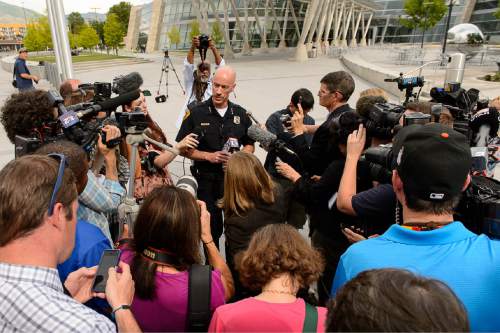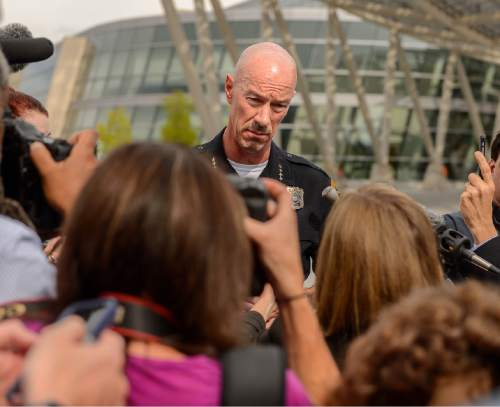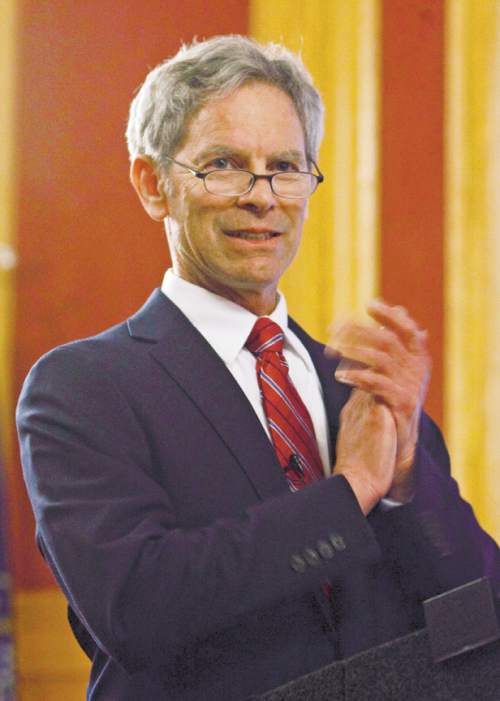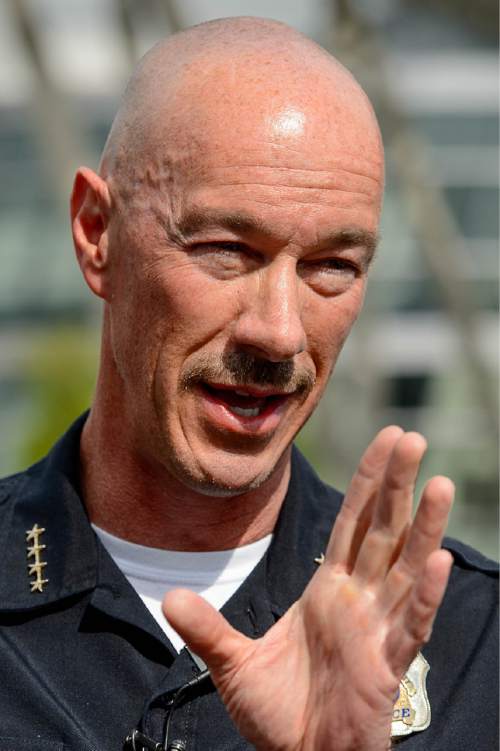This is an archived article that was published on sltrib.com in 2015, and information in the article may be outdated. It is provided only for personal research purposes and may not be reprinted.
The political seas of election season looked choppy and churning for Salt Lake City Mayor Ralph Becker a day after he forced the resignation of popular Police Chief Chris Burbank in what has become a scandal surrounding sexual harassment.
Social media lit up and letters streamed into The Salt Lake Tribune on Friday with observers sympathetic to the chief and critical of the mayor.
"What played out yesterday was real theater played out on an impromptu stage," said Tim Chambless, a University of Utah political science professor who also is affiliated with the Hinckley Institute of Politics.
"Voters are going to perceive this in a negative way. It makes them uneasy," he said. "The mayor is getting the criticism, not the chief of police."
Thursday's events may stir things up at the polls, Chambless said.
"Before yesterday, Becker was odds-on to get re-elected,'' he said. "Now voters are reassessing."
The fallout stems from substantiated sexual-harassment complaints by three female police officers against former Deputy Chief Rick Findlay. According to their notice of claim — a precursor to a lawsuit — filed late last month, the harassment began in April 2011. When the officers complained, they became targets of retaliation, the claim said.
It wasn't until mid-2013 that the Department of Human Resources and Police Civilian Review Board began separate investigations. Both substantiated the sexual harassment by January 2014.
The findings were given to Burbank immediately, and although Findlay was placed on paid administrative leave beginning in November 2013, the chief did not accept his resignation until June 4, 2014, when Findlay retired with full benefits.
The issue, rekindled by the notice of claim, spawned criticism and a spate of news stories as Becker and four challengers seek voter support in advance of an Aug. 11 primary. Only two will emerge to go on the Nov. 3 ballot.
Why now? Chambless asked of Burbank's forced resignation. "Why wasn't this [personnel] matter dealt with months ago behind closed doors?" he said. "I'm asking myself: Was this process well served or poorly served?"
—
The ouster • Thursday afternoon, Burbank was handed a statement to be read in front of assembled news media, accepting all blame for the scandal. When he refused, he was told to resign or be fired. The mayor said it wasn't election-year politicking, but rather an ongoing management problem that needed resolution.
According to Becker, his administration communicated with Burbank on a number of occasions in the spring of 2014, and the chief agreed to demote Findlay, rather than let him stay on administrative leave at his deputy chief rank.
"Your management of the outcome of the Findlay case is specifically contrary to what we agreed upon," David Everitt, Becker's chief of staff, wrote to Burbank on June 12, 2014 — eight days after Findlay retired. "No demotion occurred and no settlement agreement was executed."
In an interview Friday, Becker said his administration had been tracking items it directed Burbank to implement in Everitt's letter intended to correct the work environment for female police officers.
As the heat from the harassment case began to ratchet up again late last month, public statements by Burbank pushed the mayor to action, Becker said. Among those comments was one reported in The Tribune that Findlay paid a big price for his behavior because he lost his career in law enforcement.
"I find it just wrong, that the police chief said that the offending officer was a victim," Becker said. "The victims of sexual harassment are the ones who suffered."
But Friday, the former chief stood by his earlier statement that his departure was the product of election-year politics.
There was "not a single conversation with the mayor until a week ago on this subject," Burbank said on "The Doug Wright Show" on KSL Radio.
"Not a single conversation with anyone following up on this horrible [June 12, 2014] letter that everyone in the city was so concerned about," Burbank added. "Not a single conversation until a week ago."
The mayor's concerns, as he stated them Thursday, seemed to come out of the blue, the former chief said.
"If this was so important to the mayor, should he not have been talking directly to the police chief about his concerns?"
Becker insisted there were multiple discussions with Burbank, though they involved other city officials — not the mayor personally.
—
New dynamic? • Jackie Biskupski, a former state legislator who is running against Becker, said the events of this week may have changed the dynamics of the race.
"What I can tell you is that people feel this has not been handled well from the get-go," she said. "People are questioning Ralph differently now, and they don't see him taking any responsibility for this."
Biskupski cited statements, like one from the Becker administration reported in The Tribune on June 18, 2014, that the Findlay matter was left to Burbank's discretion.
"Now the mayor is claiming Burbank was insubordinate and didn't follow the mayor's direction," she said. "He can't have it both ways."
Another of Becker's challengers, community activist George Chapman said the chief was treated poorly by the mayor.
"Chris Burbank has given 25 years of his life to this city," he said. "He did not deserve the disrespect that Ralph Becker gave him."
Chapman also noted that Burbank's contribution as chief was significant. "He defused difficult situations and earned the trust and respect of the citizens of this city."
Another mayoral challenger, Dave Robinson, said Becker's absenteeism and lack of hands-on management led to the hostile environment in the police department and elsewhere in city government. Employees who bring up problems are "demonized and marginalized," he charged.
"I don't know if it's because he's gone to [Washington] D. C. and isn't present," Robinson said, "but the mayor is removed and cannot be reached."
Becker is president of the National League of Cities and some 200 members of the group were attending a leadership meeting in Salt Lake City as Thursday's drama erupted.
—
Questions of timing • Councilman Charlie Luke said Friday he can't understand why it took Becker so long to publicly criticize the chief for his handling of the Findlay matter.
"Last year, when I was council chairman, I raised questions to the administration about why [former] Deputy Chief Findlay continued on administrative leave until his retirement," Luke said. "Those questions were never satisfactorily answered. Chief Burbank's behavior was as unacceptable then as it is today."
Becker had every right to fire Burbank, according to Councilman Kyle LaMalfa.
"The mayor has to have a staff he can trust," LaMalfa said. "[Everitt's] letter said, demote Findlay. But the chief didn't carry out the order."
Despite his claims that he is not a politician, Burbank, like any metro police chief, is in the political arena, Holly Mullen, executive director of the Rape Recovery Center, said Friday in a Facebook post.
"He played politics on this issue and it didn't work out for him. He took a chance on insubordination and he lost," said the former Tribune columnist. "Rape and sexual harassment, and how people in power address those issues, matter to women. They should matter to everyone."
The foul political winds swirling around City Hall, she said, were created by both Burbank and Becker.
"So perhaps it takes a massive upheaval," Mullen said, "a police chief's demise, a mayor scrambling for his re-election, to drive the point home."









